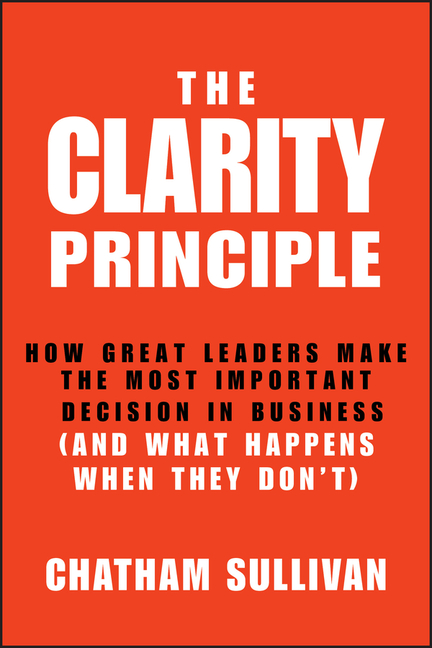The Clarity Principle
Sally Haldorson
June 07, 2013
The Clarity Principle couldn't have landed on my desk at a better time. We've been discussing a new "mission statement" for 800-CEO-READ, one that reflects our purpose as well as the product. This book gives us plenty of guidance as The Clarity Principle aims to "illuminate how difficult it is to define your business, the costs you incur when you fail to clarify your purpose, and the tremendous gains to be won by succeeding in that effort.
The Clarity Principle couldn't have landed on my desk at a better time. We've been discussing a new "mission statement" for 800-CEO-READ, one that reflects our purpose as well as the product. This book gives us plenty of guidance as The Clarity Principle aims to "illuminate how difficult it is to define your business, the costs you incur when you fail to clarify your purpose, and the tremendous gains to be won by succeeding in that effort."


Every company, including yours, exists for a reason. Every business has a purpose. Even if your organization's objective is to make money, the way it endures is by solving a particular kind of problem in the world. Whether you are a pharmaceutical carving out a unique way to treat patients, a nonprofit serving a worthy constituency, or a global retailer satisfying a particular consumer desire, your market, your customers, and the people in your organization all need to know clearly what the business is about. Just like individuals, companies need to know "who" they are, what they're up to, and why it matters. [B]usinesses that clearly understand and express their purpose outperform those that don't. Clarity of purpose, I'll argue, is a competitive imperative. It's also an existential one. Purpose, and the identity it conveys, is the lifeblood of the organization. It's what gives a business its driving motive and cohering storyline.First, the book takes a look at "Proxy Wars" and Sullivan uses a story embedded in the early days of Apple to investigate "the complicated experiences we have with colleagues in our business, and the confusing political and personal machinations we encounter at every level" which tend to reflect "the larger, more central, problems in the business." Then readers will move to chapters "The Murky Middle," which delves into dilemmas and the dangers of "decision-making paralysis," and to "Neither Fish Nor Fowl," which warns that a "business can be one thing or another but will invariably suffer when it tries to be too many things at once." The irrationality of people is a popular topic in business writing these days, and is often geared toward illuminating the ways in which expectations or assumptions fail us. Sullivan's chapter titled "The Shadow Side of Strategy" also notes that rationality is a rare thing in business (and provides research to defend the position), but also argues interestingly that it is the impermanence of strategy that leads to more reliance on the "soft stuff" of business. You can't always know what's going to happen in the long term, but you can focus day-to-day on maintaining internal company health. It's a bit zen, this. "Taking a Stand" is Sullivan's chapter on the importance of developing a fundamental purpose for your organization from a more practical (financial, developmental, strategic) angle, and "The Hunger for Purpose" is an exploration of the role of purpose in the human work experience. "The meaning we gain from purpose provides orientation and intelligibility; it also motivates. Meaning is the inner experience of being inspired by purpose." Sullivan concludes with an epilogue that encourages us all to be vigilant and resolve small issues before they escalate into unsolvable problems. All around, The Clarity Principle is a quick and stimulating read that will have you analyzing both your own behavior and that of your employees and leaders with the end goal of improving organizational health.



